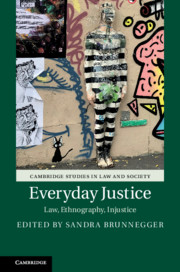Book contents
- Everyday Justice
- Cambridge Studies in Law and Society
- Everyday Justice
- Copyright page
- Contents
- Contributors
- Acknowledgments
- Chapter One Theorizing Everyday Justice
- Part One Im/possibilities of Everyday Justice
- Part Two The Force of Everyday Justice
- Chapter Four ‘We don’t work for the Serbs, we work for human rights’
- Chapter Five The Enduring Transition
- Part Three Everyday Justice Unbound
- Afterword
- Index
- Cambridge Studies in Law and Society
- References
Chapter Five - The Enduring Transition
Temporality, Human Security, and Competing Notions of Justice Inside and Outside the Law in Bosnia and Herzegovina
from Part Two - The Force of Everyday Justice
Published online by Cambridge University Press: 28 November 2019
- Everyday Justice
- Cambridge Studies in Law and Society
- Everyday Justice
- Copyright page
- Contents
- Contributors
- Acknowledgments
- Chapter One Theorizing Everyday Justice
- Part One Im/possibilities of Everyday Justice
- Part Two The Force of Everyday Justice
- Chapter Four ‘We don’t work for the Serbs, we work for human rights’
- Chapter Five The Enduring Transition
- Part Three Everyday Justice Unbound
- Afterword
- Index
- Cambridge Studies in Law and Society
- References
Summary
When does a ‘transition’ stop being a transition and simply become an indefinite status quo? When does time – and the lexicon in which it is invoked – bend itself to politics and its enactors? And how do such innovations effect daily lived experiences of human (in)security? This chapter endeavours to contribute to an understanding of the temporal limbo of Bosnia and Herzegovina after the conflicts of the 1990s and the ways in which these temporal renderings fall out of sync with ideas of everyday justice. It queries whether an international and state-orchestrated acceptance of an indefinite state of exception has recognized what justice might mean on the ground and whether the current ‘enduring transition’ can actually countenance the harms of the past in a meaningful way that might preclude their repeat. It aspires to recognize cultural repertoires that attempt to voice what everyday justice might look like, even as it critically examines how easily such moments of hope – temporal ruptures and interrogations of dominant time narratives – are stifled.
- Type
- Chapter
- Information
- Everyday JusticeLaw, Ethnography, Injustice, pp. 106 - 132Publisher: Cambridge University PressPrint publication year: 2019

